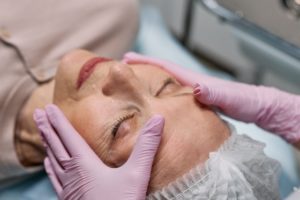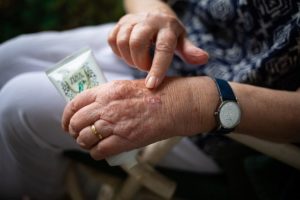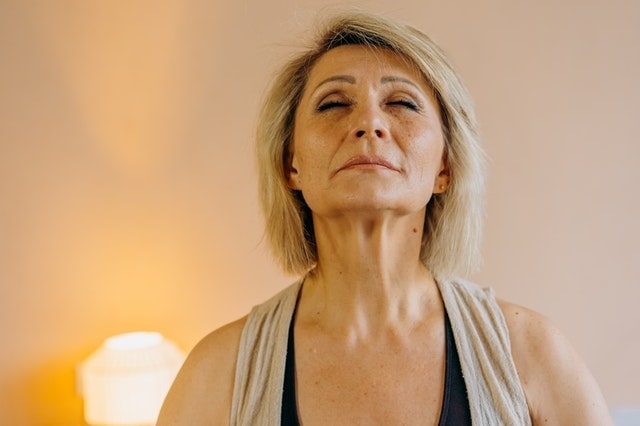As you age, certain changes are inevitable. Your hair may turn gray, your metabolism slows down, and your skin develops fine lines and wrinkles. While you can’t prevent all of these changes from occurring, you can take steps to maintain healthy, radiant skin even in your golden years as part of your everyday wellness practices. Prevention is the best medicine, but even if you’ve neglected your skin for years, taking steps now to keep your skin hydrated and healthy can make a big difference in your appearance. In fact, you can even reverse some skin damage, such as damage from exposure to UV rays and dry, dull skin that may occur from neglecting skin care over the winter months.
Healthy, vibrant skin can make you look years younger, so if you want to take a few years off your appearance, it’s time to improve your skin care routine. We’ve rounded up 50 expert tips and best practices to help you improve your skin care and maintain healthy, glowing skin no matter your age. The tips below include insights on how your skin changes throughout the aging process, tips for preventing cancer and other skin conditions, and tips for maintaining healthy skin as you age:
- How Skin Changes as You Age
- Tips for Preventing Cancer, Dry Skin, and Other Skin Conditions
- Skin Care Tips to Maintain Healthy Skin as You Age
How Skin Changes as You Age
 Skin becomes thinner and less elastic as you age. The Mayo Clinic explains that the fatty tissue located just underneath the skin decreases over time, resulting in less plumpness. The skin also becomes thinner over time and loses the elasticity that allowed it to bounce back for most of your life.
Skin becomes thinner and less elastic as you age. The Mayo Clinic explains that the fatty tissue located just underneath the skin decreases over time, resulting in less plumpness. The skin also becomes thinner over time and loses the elasticity that allowed it to bounce back for most of your life.- The body produces less collagen and elastin. These proteins make the skin strong and flexible, so when the body has less collagen and elastin, the becomes less flexible and tears more easily, according to Merck Manual.
- Dry skin is more common among older adults. This can be due to too much sun exposure, not drinking enough fluids, a loss of sweat and oil glands as you age, and more, as well as health conditions such as kidney disease or diabetes.
- Senile Purpura is common among seniors. These purple spots develop on the arms and legs due to the thinness of the skin and the presence of fragile blood vessels and capillaries under the skin’s surface.
- Certain medications contribute to dry skin. Diuretics are one of the most common culprits. If you’re taking a medication that may cause skin dryness, you’ll want to step up your moisturizing routine.
- Your sweat glands produce less sweat as you age. This makes it more challenging to stay cool, increasing the risk of overheating and heat injury such as heatstroke and heat rashes.
- Lesions and benign growths are more common among older adults. According to Consultant360, neoplasms such as seborrheic keratoses are common among the elderly. Some of these lesions should be monitored closely and removed if skin cancer is suspected.
- Bone loss around the jaw and chin affects the skin. Bone loss can lead to skin puckering and wrinkles around the mouth. This can occur in both smokers and non-smokers, although it may be more likely or more noticeable in those who are current or former smokers.
- The skin may lose sensory receptors. A reduction in sensory receptors and sensory nerve endings in the in the epidermis and dermis often occurs with aging. These receptors and nerve endings allow the body to feel pressure, pain, and temperature. A loss of these receptors can reduce a person’s ability to detect changes in the environment, which makes them more susceptible to injuries.
- Solar keratoses may develop. Solar keratoses are areas of inflamed, dry, and scaly skin commonly appearing on the cheeks, upper lip, backs of the hands, and the bridge of the nose. These areas should be monitored by a doctor or dermatologist regularly as squamous cell carcinoma, a form of skin cancer, may develop.
- The skin becomes thinner. The thinning of the skin leads to a more transparent appearance and can increase the risk of bruising, abrasions, skin tears, and other wounds.
- Infection, irritation, and slow healing are more likely. As the skin becomes thinner, it also becomes more susceptible to irritation and infection, and wounds may take longer to heal.
- Bedsores may develop in older adults who sit or lie down for long periods of time. Bedsores are also known as pressure ulcers and are common among seniors with mobility issues who spend a lot of time sitting or laying in the same position.
- Changes in estrogen levels affect the skin. Fluctuations in hormones, particularly estrogen, contributes to enlarged pores, sagging skin, and acne breakouts.
Tips for Preventing Cancer, Dry Skin, and Other Skin Conditions
 See a dermatologist at least once each year for a skin check. Apex Skin points out that skin cancer is the most common type of cancer in the U.S., with one out of five people experiencing it at some point in their lifetime. Early detection is key, and a dermatologist knows precisely what to look for and can monitor changes to your skin over time to catch any signs of skin cancer early.
See a dermatologist at least once each year for a skin check. Apex Skin points out that skin cancer is the most common type of cancer in the U.S., with one out of five people experiencing it at some point in their lifetime. Early detection is key, and a dermatologist knows precisely what to look for and can monitor changes to your skin over time to catch any signs of skin cancer early.- Wear broad-spectrum sunscreen daily, even when it’s cloudy. Sunscreen with an SPF 30 or greater blocks harmful UV rays to prevent sun damage and can also protect against free radicals that contribute to the aging process.
- Wear protective clothing outdoors. Loose, lightweight shirts and wide-brimmed hats can help protect your skin from the sun’s harmful UV rays.
- If you smoke, quit. Smoking has negative health consequences, including negative effects on your skin. Smoking reduces blood flow, contributes to the formation of wrinkles, and can result in your skin having a leathery appearance, according to Harvard Health.
- Combat dark spots with retinol and vitamin C. If you’re noticing dark spots on your skin from sun damage, you can combat the effects by using a product containing retinol (a derivative of vitamin A) and vitamin C, which helps to reduce darkening pigmentation and can brighten dull skin.
- Wash your face less often. It may sound counter-intuitive, but aging skin produces less sebum, contributing to dry skin. Wash your face in the evening to remove makeup and other debris that may have accumulated during the day. In the morning, rinsing with warm water is all that’s needed.
- Eat more fruits and vegetables. A healthy, balanced diet with ample nutrient-rich fruits and vegetables can help prevent many health conditions, but it can also have a positive effect on your skin. If you’re not getting enough vitamins and minerals in your daily diet, consider adding a supplement (but talk to your doctor first).
- Avoid alcohol. Alcohol dehydrates the body – and that means the skin, too. Skip the alcohol to help keep your skin hydrated and supple.
- Test products on your arm before using them on your face. People with sensitive skin in particular should apply them to a small area on the arm before using them on the delicate skin on your face. Products that you once used regularly when you were younger can cause redness and irritation later in life, so testing all products that you haven’t used in a while is a good idea.
- Exercise regularly. Yes, exercise helps to maintain healthy skin, too. It helps to improve blood flow and nourish your skin cells while also removing toxins from the skin. Plus, it helps to combat stress, which can reduce the symptoms of chronic skin conditions.
- Reduce stress. While you may not be able to eliminate stress from your life, you can take steps to reduce it, such as exercising (as noted above), taking walks, meditating, or other stress-busting measures that work for you. How does stress affect your skin? It increases the body’s production of cortisol, known as the stress hormone, which can speed the process of DNA damage and skin aging.
- Drink enough water. Even if you’re eating water-rich fruits and vegetables, you should still be drinking an ample amount of water each day. Water keeps the body hydrated and helps to flush out toxins that can contribute to skin problems.
Skin Care Tips to Maintain Healthy Skin as You Age
 Use aloe vera for its healing properties. Studies have found that aloe vera, taken orally or applied topically, can increase collagen synthesis, allowing wounds to heal faster.
Use aloe vera for its healing properties. Studies have found that aloe vera, taken orally or applied topically, can increase collagen synthesis, allowing wounds to heal faster.- Moisturize daily with unscented or lightly scented moisturizer. Applying moisturizer to your skin daily helps your skin stay hydrated. Applying moisturizer right after a shower helps to lock in some of the moisture, as well.
- Use a humidifier if the air is dry. The ideal indoor humidity is between 45% and 60%, so if the air is dry where you live throughout the year or just during the winter, using a humidifier can help reduce dry, itchy skin.
- Use gentle cleansers. Gentle cleansers remove dirt without stripping moisture from your skin. Harsh cleansers that remove moisture from the skin contribute to dry, itchy skin.
- Use warm water instead of hot water when bathing. Hot water can strip the skin of its natural oils, exacerbating dry skin.
- Skip the sugar and refined carbohydrates. A well-balanced diet can help to maintain healthy skin as you age, but consuming too much sugar and too many refined carbs can have the opposite effect, according to the American Academy of Dermatology Association.
- Improve your skin barrier by consuming more omega-3 fatty acids. Omega-3s are found in foods like fish, walnuts, and some seed and plant oils and can help improve the skin’s natural barrier, helping to block out skin irritants and lock in moisture.
- Use skin care products with alpha-hydroxy acids (AHAs). AHAs have been shown to reduce some of the signs of sun damage in studies.
- Use products that contain retinol. Retinol is derived from vitamin A and prevents damage by free radicals by acting as an antioxidant.
- Get a good night’s sleep. Sleep may not seem like it has much to do with your skin health, but tissue repair and muscle growth occur while you’re sleeping. This allows your skin valuable time to heal from the effects of the day.
- Aim for 7 to 8 hours of quality sleep each night. Getting enough sleep – and sleep of good quality as noted above – helps to ward off dark circles under the eyes and enhances your complexion.
- Sleep on your back or use a pillow that prevents wrinkles. Sleeping with your face against a standard pillow can result in the formation of permanent lines and wrinkles in your skin. That’s why sleeping on your back is best, but if you can’t do that, purchase a pillow designed specifically to prevent wrinkling.
- Wear gloves to protect your hands. Your hands are often in situations that can be potentially damaging, such as washing dishes, which exposes your skin to hot water and dish detergent or gardening, which can result in nicks and cuts. Wearing gloves when you’re working on these and similar tasks can help to protect the skin on your hands.
- Use anti-aging hand cream. A good hand cream with anti-aging properties helps to protect the delicate skin on the back of your hands that’s often exposed to the conditions mentioned above. Keeping this skin moisturized and protected can slow the aging process, preventing dark spots and crepey skin.
- Exfoliate regularly to remove dead skin cells. Exfoliation helps to even out the surface of the skin by removing dead skin cells that can make the skin appear dull and revealing the fresh skin cells underneath.
- Use the right type of cleanser for your skin. Aging skin can benefit from glycolic cleansers with extra moisturizing effects or milky cleansers. If you have dark spots or melasma, cleansers containing alpha-hydroxy acids can have a skin-brightening effect.
- Use an essence. An essence is a lesser-known anti-aging product that’s applied after cleansing but before applying serums or other products. It helps to prepare the skin for the application of the other products in your skin care regimen while reducing the appearance of fine lines, smoothing out your skin texture, and boosting skin radiance.
- Eat water-rich fruits and vegetables. Eating fruits and vegetables that have a high water content improves nutrient absorption by the body and can help to improve skin health.
- Pat products onto your face – don’t rub. Rubbing products on your face may result in pulling on your skin and can create friction that may irritate or inflame the delicate skin around your eyes. Patting products onto the skin is a gentler approach that can actually stimulate blood flow and increase the absorption of the ingredients, so it’s a win-win.
- Avoid rubbing your eyes. While the occasional rub isn’t likely to cause much harm, rubbing your eyes often can lead to inflammation, permanent lines and wrinkles, and darkness.
- Take shorter baths or showers. The longer you spend in the shower or bath, the more natural oils can be stripped from your skin. Keep showers and baths short to help prevent dry skin.
- Be aware of medications that cause sun sensitivity. Certain medications can make your skin more sensitive to the sun. If you’re taking one of these medications, take extra precautions to stay in the shade and shield your skin from the sun’s harmful rays.
- Use products with built-in sunscreen. Applying sunscreen with an SPF 30 or greater is recommended, but you also want to minimize the number of products you’re layering on your skin. Look for skin care products with built-in sunscreen to remove a step from your skin care routine.
- Use products containing hyaluronic acid. Hyaluronic acid helps to replenish and retain cell moisture, which can reduce the appearance of fine lines and wrinkles.


